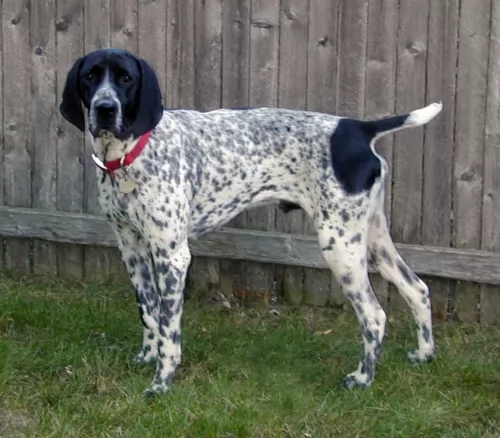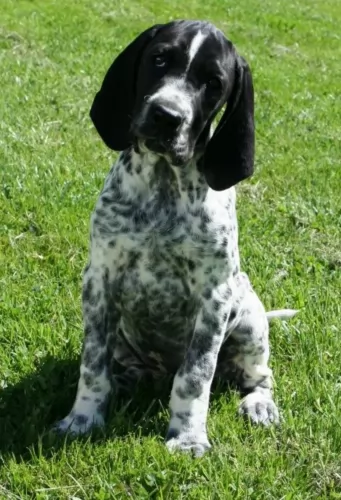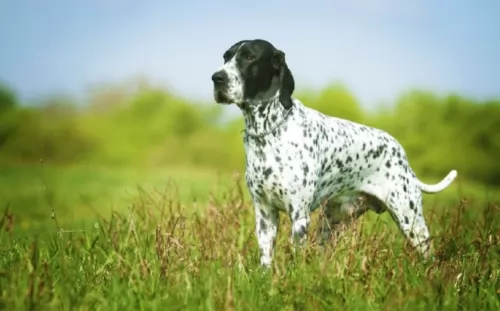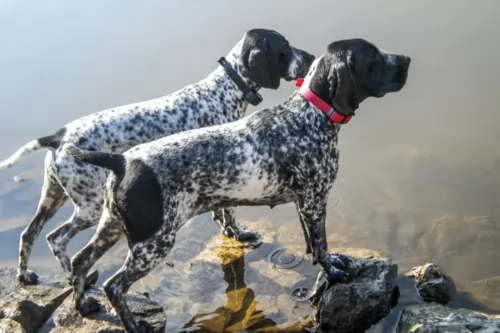 Petzlover
Petzlover Braque d'Auvergne is originated from France but Gull Dong is originated from Pakistan. Braque d'Auvergne may grow 41 cm / 16 inches shorter than Gull Dong. Both Braque d'Auvergne and Gull Dong are having almost same weight. Braque d'Auvergne may live 3 years more than Gull Dong. Both Braque d'Auvergne and Gull Dong has almost same litter size. Both Braque d'Auvergne and Gull Dong requires Low Maintenance.
Braque d'Auvergne is originated from France but Gull Dong is originated from Pakistan. Braque d'Auvergne may grow 41 cm / 16 inches shorter than Gull Dong. Both Braque d'Auvergne and Gull Dong are having almost same weight. Braque d'Auvergne may live 3 years more than Gull Dong. Both Braque d'Auvergne and Gull Dong has almost same litter size. Both Braque d'Auvergne and Gull Dong requires Low Maintenance.
 Sometime over 5 centuries ago, in the Cantal Region of France, was born a hunting breed, that might be the real ancestor of today’s pointing hunter dogs. Perhaps the oldest of all pointing gun dog is the Braque d’Auvergne. This breed comes from Central France in the region of Auvergne. This breed was developed prior to written dog breeding records in order to hunt in this region and find, point, flush out and retrieve fowl. This breed is clearly one of if not the oldest breeds in the French Braque. There is no agreement among historians on what breed is the oldest of the European pointing dogs and where they were developed – was it Spain or was it France? It is thought that the Braque Francais Gascogne is the original one of these in the early 1600’s while the Braque d’Auvergne came soon after. Due to the different hunting needs in the different parts of France, the Braque Francais Gascogne was crossed with a lot of other local scent hounds. The Braque d’Auvergne is one of the very oldest of all of these. There are records of the breeds existence in the 1700’s. It is probable that the Braque d’Auvergne was developed by crossing local dogs with Gascogne as well as with the Petit Bleu de Gascogne and the Grand Bleu de Gascogne.
Sometime over 5 centuries ago, in the Cantal Region of France, was born a hunting breed, that might be the real ancestor of today’s pointing hunter dogs. Perhaps the oldest of all pointing gun dog is the Braque d’Auvergne. This breed comes from Central France in the region of Auvergne. This breed was developed prior to written dog breeding records in order to hunt in this region and find, point, flush out and retrieve fowl. This breed is clearly one of if not the oldest breeds in the French Braque. There is no agreement among historians on what breed is the oldest of the European pointing dogs and where they were developed – was it Spain or was it France? It is thought that the Braque Francais Gascogne is the original one of these in the early 1600’s while the Braque d’Auvergne came soon after. Due to the different hunting needs in the different parts of France, the Braque Francais Gascogne was crossed with a lot of other local scent hounds. The Braque d’Auvergne is one of the very oldest of all of these. There are records of the breeds existence in the 1700’s. It is probable that the Braque d’Auvergne was developed by crossing local dogs with Gascogne as well as with the Petit Bleu de Gascogne and the Grand Bleu de Gascogne.
In all of Western Europe, the region of Auvergne is not very populated and has unique geography in that is hilly and has many extinct and eroded volcanoes. A lot of the region is still unpopulated. In this environment, wildlife has flourished, and hunting is successful in providing food for the regions people. This circumstance with an abundance of birds, led to the breeding of the Braque Auvergne to specialize in hunting in this area. The breed is not very popular outside of Auvergne and probably never was. That fact allowed them to be devastated by the Second World War. The Reunion des Amateurs de Braque d’Auvergne (RABA) was started to promote the pure breeding and the protection of the d’Auvergnes. But when Auvergnes was occupied during the war, the slowed breeding of the Braque d ‘ Auvergne almost eliminated the breed. There might have only been about 25 dogs left following the end of the war. These remaining dogs were used to revive the breed, but it is still uncommon, but not rare. Individuals have been imported by other countries including North America. The United Kennel Club (UKC) accepted the breed in 2006 but is not accepted by the AKC (American Kennel Club). The breed is still a working breed and outside of France, very rare.
 The Gull Dong dog is thought to come from British Colonial India during the 1900's. The area later became known as Pakistan, and this is where the dog originated from.
The Gull Dong dog is thought to come from British Colonial India during the 1900's. The area later became known as Pakistan, and this is where the dog originated from.
Known also as the Bully Gull Terr, the dog came about by crossing Bully Kutta (Pakistani Mastiff) with a pure bred Gull Terr. The breeders wanted a dog that had the best features and characteristics of both the 2 dog breeds.
They were looking for particular characteristics such as size, strength and speed. This is a rare dog breed and he isn’t associated with any kennels or clubs, so not many records have been kept regarding their origin and development.
 The Braque d’Auvergne is a well built, strong hunting dog with long ears, a large head and a docked tail. His coat is white with black markings and black ears and head. The breed looks a lot like all the other pointing dogs from France. They are medium in stature and has the appearance of a working gundog. He is athletic, muscular and fit. Docking the tail is outlawed in many countries and all of the United Kingdom. In that case the tail is high on the rump and always straight. Their face and head are big for the size of the body and shaped like an oval. With a long muzzle, deep set eyes and a gentle expression, they are kindly and handsome dogs. Their skin is loose but not droopy or wrinkled like hound dogs.
The Braque d’Auvergne is a well built, strong hunting dog with long ears, a large head and a docked tail. His coat is white with black markings and black ears and head. The breed looks a lot like all the other pointing dogs from France. They are medium in stature and has the appearance of a working gundog. He is athletic, muscular and fit. Docking the tail is outlawed in many countries and all of the United Kingdom. In that case the tail is high on the rump and always straight. Their face and head are big for the size of the body and shaped like an oval. With a long muzzle, deep set eyes and a gentle expression, they are kindly and handsome dogs. Their skin is loose but not droopy or wrinkled like hound dogs.
 The deep chested Gull Dong is a large dog and stands at 76 – 106cm in height and weighs in the region of 40 – 63kg.
The deep chested Gull Dong is a large dog and stands at 76 – 106cm in height and weighs in the region of 40 – 63kg.
He has a short, smooth coat in various colors such as white, grey, black, brindle or bi-color such as white with black spots. He is a muscular, powerful breed dog and his ears are mostly cropped, but when left they are short and floppy. His tail can be docked but these days it tends to be left long. He has a huge head, and similar to bulldogs, this mastiff dog has loose skin around the jaw and neck.
This is a strong-willed dog who is also intelligent. Just his sheer size will require that you have him trained and socialized. It is actually important to train and discipline this dog as he is strong willed. He is intelligent and learns easily.
After training, he will require a strong, firm and consistent owner. He is fairly suspicious of strangers and won't take kindly to anyone who tries to come onto his properly. He is a dominant, aggressive dog and while he is a loyal, loving pet with his human family, he isn't an ideal dog to have with small children in the home.
 This is a gentle, adaptable and obedient breed. With their intelligence and affectionate nature, they make great family dogs and are eager to please their people. Living with other dogs is fine but not with small, prey size animals. The Braque d’Auvergne should never be left alone pets like gerbils and hamsters. They must be socialized to cats as pets and not prey before living with them successfully. They need to work closely with one human partner. They are first and foremost a hunting dog and need some sort of hunting simulation. They are devoted to their families and want to be constantly in their presence. This can lead to separation anxiety if they are left alone too much. They are great with children and need a family.
This is a gentle, adaptable and obedient breed. With their intelligence and affectionate nature, they make great family dogs and are eager to please their people. Living with other dogs is fine but not with small, prey size animals. The Braque d’Auvergne should never be left alone pets like gerbils and hamsters. They must be socialized to cats as pets and not prey before living with them successfully. They need to work closely with one human partner. They are first and foremost a hunting dog and need some sort of hunting simulation. They are devoted to their families and want to be constantly in their presence. This can lead to separation anxiety if they are left alone too much. They are great with children and need a family.
 This is a powerful, intelligent dog and with training and socialization he is capable of becoming a loving, protective pet who listens to you.
This is a powerful, intelligent dog and with training and socialization he is capable of becoming a loving, protective pet who listens to you.
He does tend to be aggressive and therefore people who are buying a dog for the first time might battle with the characteristics of this dog. He will certainly need a firm, strong, patient owner. He isn't the wisest choice for when you've got small children in the house, though well trained dogs and children are able to get along well together.
When your heavy, muscular Gull Dong is handled in a firm, kind manner, he is well exercised and fed and treated firmly and kindly, he is able to make a great, loyal companion.
 The Braque d’Auvergne is a healthy breed but can face some of the same health concerns as other pointers and hunting dogs. The long, droopy ears can get infected easily if wet and need to be cleaned regularly so that food or dirt are not trapped their either. Because of the small gene pool however they may be at risk for several issues. The breeders in France express concerns about possible hip dysplasia and testing is highly recommended. Because they are at risk for other conditions that might not show up until later in life, it is also recommended that they be tested by the Canine Eye Registration Foundation (CERF) as well as the Orthopedic Foundation for Animals (OFA).
The Braque d’Auvergne is a healthy breed but can face some of the same health concerns as other pointers and hunting dogs. The long, droopy ears can get infected easily if wet and need to be cleaned regularly so that food or dirt are not trapped their either. Because of the small gene pool however they may be at risk for several issues. The breeders in France express concerns about possible hip dysplasia and testing is highly recommended. Because they are at risk for other conditions that might not show up until later in life, it is also recommended that they be tested by the Canine Eye Registration Foundation (CERF) as well as the Orthopedic Foundation for Animals (OFA).
 The Gull is a fairly healthy dog, and with good care he can reach 10, 11 or 12 years of age.
The Gull is a fairly healthy dog, and with good care he can reach 10, 11 or 12 years of age.
If you choose to own a white one, you will know that he is susceptible to deafness and skin problems. White coated dogs battle with deafness, and the reason for this is that they carry the piebald gene. The piebald gene is a result of the absence of melanocytes – those cells which create pigment.
The ability to hear comes from a layer of cells within the inner ear which come from the same stem cell source. Without this stem cell, the dog isn't able to make this specialized layer of hearing cells.
With hip dysplasia, the head of the thigh bone doesn’t fit properly into the hip socket, resulting in the bone wearing away and arthritis settling in. Your dog can experience pain and stiffness and he can become lame. You'll notice he is no longer enthusiastic to join in with games and exercise.
Hip dysplasia can be managed with medication while some dog owners, if they can afford it, turn to surgery which can be very costly.
He is a deep chested dog and this means you need to be aware of the risks associated with bloat, an emergency gastrointestinal syndrome which can be life threatening and where your dogs stomach becomes hard and bloated.
 The Braque d’Auvergne needs a high-quality diet fit for a working dog but not too much to make him obese. They are an active breed to choose a formula that is designed for working dogs.
The Braque d’Auvergne needs a high-quality diet fit for a working dog but not too much to make him obese. They are an active breed to choose a formula that is designed for working dogs.
Although no studies have been conducted on the Braque d’Auvergne’s health issues there are many conditions that similar breeds are susceptible to and the d’Auvergne might be as well. This includes any of the following:
This is an active, working dog who needs a lot of stimulation and exercise. The only real appropriate exercise for these dogs is hunting or outings in the woods. He not only needs the exercise, but he also needs to stimulate his sense of smell and his gundog intelligence. He might excel in lure chase or even a form or barn hunt. They certainly could excel at obedience trials and perhaps rally. If you are a weekend hunter then this is the ideal dog for you. They are so easy to train that they surpass other pointers for success with casual hunters. They hunt at a slower pace than many other gundogs. Their intelligence and athleticism lend itself well to agility and flyball also. They need a large (+acres)fenced in area to run and play.
 Plenty of room to run around in is important for the Gull Dong as he is a working breed who is used to having a job to do. You will certainly need to take him on walks or play rope- and ball games with him.
Plenty of room to run around in is important for the Gull Dong as he is a working breed who is used to having a job to do. You will certainly need to take him on walks or play rope- and ball games with him.
The Gull will require brushing twice a week as he is a short haired dog and an average shedder.
This is a large energetic dog and you will need to feed him a high quality food specially for large, energetic dogs. He needs his full quota of minerals and vitamins in his food. Provide him with homemade food such as cooked chicken, rice and vegetables and some raw meat from time to time. Never leave him without a constant supply of fresh, cool drinking water.